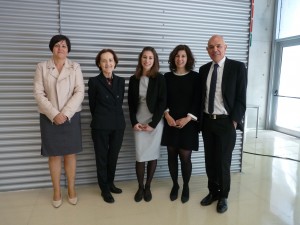Pilar Calleja, PhD student under the supervision of Prof. Antonio M. Echavarren (ICIQ), has defended her PhD Thesis entitled “Gold-Catalyzed Synthesis of 5 and 6-Membered Rings for the Construction of Molecular Diversity”‘ (assigned to the Organic and Analytical Chemistry Department of the Universitat Rovira i Virgili) publicly on April 28th at the ICIQ Auditorium.
The members of the evaluation committee were: Prof. Rosa Maria Claramunt (UNED), Prof. Yolanda Díaz (URV) and Prof. Mª Ángeles Fernández (University of Amsterdam)
Abstract
The research developed in this Doctoral Thesis comprises from the preparation of polyaromatic compounds to the synthesis of natural product derivatives, highlighting the proficiency of homogeneous gold catalysis for the construction of molecular diversity.
A novel approach for the synthesis of a new trindane-based crushed fullerene C60 was developed by a threefold palladium-catalyzed cross-coupling of four suitably functionalized C15 trindene fragments. The trindane C15 skeleton of the central motif was constructed through a triple gold(I)-catalyzed oxidative cyclization.
The scope of the intramolecular gold(I)-catalyzed formal [2+2+2] cycloaddition reaction was extended to O-protected homopropargylic and allylic oxo-1,5-enynes. Under the optimized reaction conditions, the cyclization of (Z)- and (E)- isomers takes place with moderate to excellent yield and increased selectivity in most of the cases, providing access to octahydro-1H-indenes skeletons.
The mastery of gold(I) complexes for the construction of complex polycyclic scaffolds was applied in the context of the total synthesis of natural products. Thus, two different methodologies were used in the construction of the core skeleton of two families of natural products, the pycnanthuquinones and the carexanes. Furthermore, the first total synthesis of racemic carexane I was completed in 8 steps and 7% overall yield featuring a gold(I)-catalyzed 6-endo-dig cyclization as the key step.
Finally, we performed a detailed examination of gold(I) catalyzed skeletal rearrangements of different model 1,6-enynes bearing OR groups at the propargyl position, which are prone to undergo intramolecular 1,5-migration in the absence of external nucleophiles.
